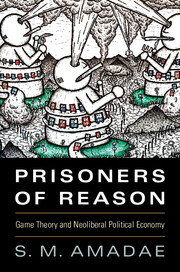PART III - EVOLUTION
Published online by Cambridge University Press: 18 December 2015
Summary
Game theory is a general lexicon that applies to all life forms. Strategic interaction neatly separates living from nonliving entities and defines life itself. Strategic interaction is the sole concept commonly used in the analysis of living systems that has no counterpart in physics or chemistry.
Game theory provides the conceptual and procedural tools for studying social interaction, including the characteristics of the players, the rules of the game, the informational structure, and the payoffs associated with particular strategic interactions. The various behavioral disciplines (economics, psychology, sociology, politics, anthropology, and biology) are currently based on distinct principles and rely on distinct types of data. However, game theory fosters a unified analytic framework available to all the behavioral disciplines. This facilitates cross-disciplinary information exchange that may eventually culminate in a degree of unity within the behavioral sciences now enjoyed only by the natural sciences …. Moreover, because behavioral game-theoretic predictions can be systematically tested, the results can be replicated by different laboratories. This turns social science into true science.
Herbert Gintis, 2009Prisoners of Reason argues that neoliberal capitalism and governance reflect a new theoretical rationale that was initially developed and applied to prosecute the Cold War through exercising credible military threats, many of unimaginably devastating nuclear destruction. Policy analysts and social scientists came to accept strategic rationality as the epitome of human reasoning, thus rendering obsolete formerly accepted perspectives on intelligible action. Most prominently, in its orthodox operationalized form, strategic rationality only permits agents to pursue outcomes in competition with others over scarce, instrumentally salient resources. This book's primary goal is to render clearly how this new understanding of rational action sustains neoliberal markets and government in direct contradiction to classical liberalism.
Noncooperative game theory adopts a stance toward action that accepts actors’ preferences as given; models action choices descriptively, normatively, or prescriptively depending on the context; and seeks solutions or equilibrium outcomes that will obtain assuming that actors maximize expected utility with varying attitudes toward risk. In John von Neumann and Oskar Morgenstern's original articulation, this science of choice claims to be an exhaustive treatment of rationality in all decisions involving more than one individual. Therefore, it offers to agents the imperative to comply with its principles of choice, tacitly linked to survival and success, or to suffer the fate of irrationality and loss.
- Type
- Chapter
- Information
- Prisoners of ReasonGame Theory and Neoliberal Political Economy, pp. 245 - 251Publisher: Cambridge University PressPrint publication year: 2016



